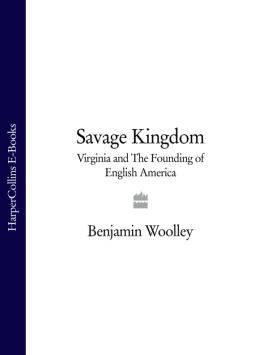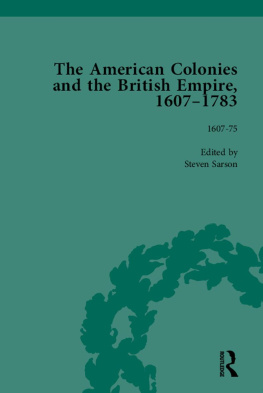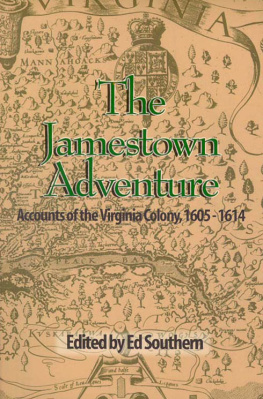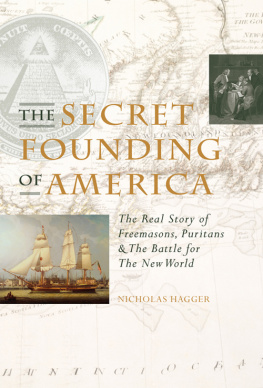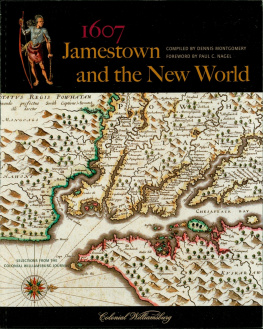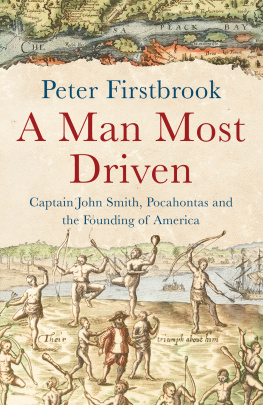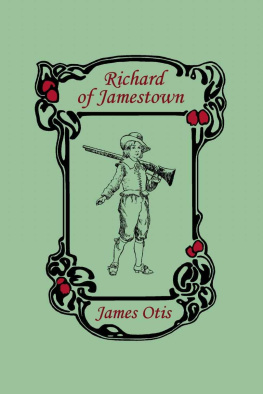Spellings have been modernised, and in the case of the names of people and places, standardised. Dates are generally Old Style, but with the new year starting on 1 January.
I am grateful to the British Library, Library of Congress, Library of Virginia, University of Virginia Library, Bodleian Library, Folger Shakespeare Library and Huntington Library for help in consulting their collections. My thanks to: Gregory H. Stoner, Virginia Historical Society; Terry Tuey, McPherson Library, University of Victoria; Nettie Stoppelenburg, Archives Service in Utrecht; Theo Pollemans, Oudewater, Netherlands; Julian Roberts; Nicholas Lee, University of Bristol; Rick Beyer, Plate of Peas Productions; David Sacks, Reed College; Stanley Wells, Shakespeare Birthplace Trust; Jocelyn Wingfield; Paul Embler; John McCavitt; Robert Massey, Royal Observatory; Catherine Beaumont, Otley Hall; Bly Straube, Historic Jamestowne; Patrick Martin, Herbert Law Center, Louisiana State University; Crandall Shifflett, Virginia Tech, creator of Virtual Jamestown (www.virtualjamestown.org) and Richard Rabinowitz, American History Workshop.
Personal thanks to Jack Russell, Barbara Briggs, Sir Roger and Lady Bannister, Arabella Pike, Anthony Sheil, Asha Joseph and Matthew Woolley.
ONE
A Feast of Flowers and Blood
ON THE MORNING of 20 September 1565, the sixty-year-old carpenter Nicolas le Challeux awoke to the sound of rain pelting down on the palm-leaf thatch overhead. It had not stopped for days, and a muddy morass awaited him outside.
When he had arrived in Florida the previous month, a sunnier prospect had beckoned. He had left the terrors of his native France far behind, and come to a place where he could practise his craft and religion in peace. Its very name suggested renewal, the Spanish explorer Juan Ponce de Len calling it Florida after the season in which he first sighted its shores: Easter Week, or Pascua Florida, the feast of flowers.
Florida could furnish all that a man could wish on earth, Challeux had been told. It had received a particular favour from heaven, suffering neither the snow nor raw frost of the North, nor the drying, burning heat of the South. The soil was so fertile, the forest so full of wild animals, the honest and gentle natives could live off the land without having to cultivate it. There were even reports of unicorns, and of veins of gold in a great mountain range to the north called the Appalatcy. It was impossible that a man could not find there great pleasure and delight, Challeux was assured.
The contrast with the state of his homeland was stark. Europe was in turmoil. To the south, the Catholic Spanish and Holy Roman empires, offshoots of a single dynasty, domineered. In the north, Queen Elizabeth reigned over Europes upstart Protestant monarchy England, while her subjects egged on their co-religionists in the Low Countries (modern Netherlands and Belgium), who were fighting for independence from their Spanish overlords. To the east stretched the Islamic Ottoman Empire, Suleiman the Magnificent resting an elbow upon the Balkans, a heel upon Basra. And in the middle lay France, a Catholic country penetrated by a powerful Protestant or Huguenot minority. Exposed to so many religious and political tensions, it threatened to disintegrate, and in 1562, a series of civil wars erupted across the kingdom that were so brutal, they gave the word massacre, French for a butchers block, its modern meaning.
It was from the midst of this maelstrom that Gaspard de Coligny, leader of the Huguenots, had dispatched a fleet under the command of his kinsman Ren de Laudonnire to found a Protestant refuge in Florida. To the eyes of Colignys Catholic enemies, this was a provocative move. Though its coastline was still only hazily charted, and some even doubted it was a single land mass, all of North America was claimed by the Spanish under a famous bull or edict issued by Pope Alexander VI shortly after Christopher Columbuss historic expedition of 1492. This had donated all the remote and unknown mainlands and islands in the Atlantic to the Iberian kingdoms of Spain and Portugal, so they could bring the native populations to the worship of our Redeemer and profession of the Catholic faith. By sending his men to Florida, which was within convenient reach of Spanish possessions in Cuba and Mexico, Coligny was clearly challenging not only the Spanish claim, but the religious authority underpinning it.
However, Colignys exiles had found Florida untouched by the Spanish, and settled themselves on the banks of the River of May (now called St Johns River, near modern Jacksonville), on a pleasant open space covered with various kinds of grasses and plants. They called their new home Fort Caroline, after Frances Catholic King Charles IX, in the hope of forestalling reprisals. Old Challeux had arrived the following year with another consignment of refugees, on a supply ship captained by Jean Ribault, a prominent Huguenot, as well as one of Frances most accomplished seamen.
Conditions for the newcomers turned out to be less Elysian than advertised. The hundred or so settlers who had been there a year had run out of supplies, and were living off wild fruits, berries, the occasional crocodile, and goods stolen from the local Indians. There were also reports that the Spanish had been tipped off about Colignys project, and had sent a fleet which was even now roving the coast.
Over the coming weeks, Challeux joined a team of workmen who, under the direction of John de Hais, master carpenter, tried to reinforce La Carolines fragile palisade. The state of the forts defences was pitiful. The triangular layout was breached in two places, along the western side, and the long southerly wall facing the river, where the foundations for a grange to store the settlements artillery and munitions lay partially built.
The weather hampered the workmens efforts. Daily deluges washed away the embankment supporting the palisade wall, and intervals of baking sunshine were too fleeting to allow the damage to be repaired. Meanwhile, the surrounding landscape became more and more saturated. Rivers burst their banks, meadows became marshland.
And so, on this September morning, Challeux faced another day of hard labour in the remorseless rain. Nevertheless, he managed to rouse himself, put on a damp and rotting cloak, and gather his tools.
A few hundred yards away, beyond the curtain of incessant rain, Don Pedro de Menndez de Avils lay in wait at the head of a column of five hundred soaking, disgruntled but well-armed Spanish troops. Menndez was a Spanish noble and naval commander. He had arrived in Florida with a fleet of Spanish galleons a few days before Ribault, with orders to exterminate the Lutherans and establish himself as Adelantado or governor of Florida, which King Philip II of Spain declared extended all the way from the keys on the southernmost tip of the Florida peninsula to Newfoundland.
Menndez had anchored his ships in the River of Dolphins (modern Matanzas River), about thirty-five miles south of Fort Caroline. There, on 28 August, he had set about building a military base, which he called St Augustine, in honour of the feast day upon which construction work had begun. After several weeks gathering intelligence about Fort Caroline from local Indians, and harrying Ribaults fleet, he decided to mount a land attack on the French settlement.
The journey from St Augustine to Fort Caroline had proved dangerous and tiring. Though led by Francis Jean, a French defector who had lived in Fort Caroline, Menndezs troops got lost. They had to make their way through morasses and desert paths never yet trod, often up to their armpits in water, holding heavy knapsacks, ladders (for scaling the forts palisade) and harquebuses (a heavy forerunner to the musket) above their heads. They had finally reached a little rise in the ground overlooking Fort Caroline in the early morning of 20 September, the eve of the day of the Blessed Apostle and Evangelist St Matthew.

